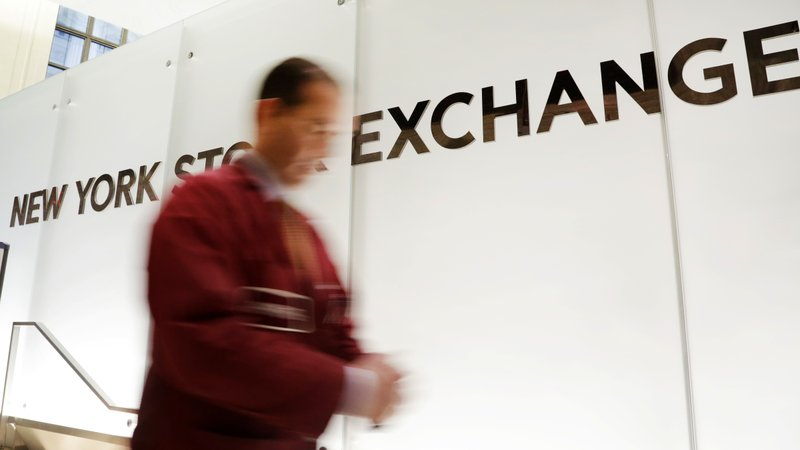
Stocks were hanging onto some of their early gains Monday afternoon on expectations that lower taxes will help corporate profits pile up even higher.
Congress moved closer to overhauling the U.S. tax system over the weekend, after the Senate narrowly approved its package of cuts.
Lower tax rates would help boost profits for companies, which already have been reporting resurgent earnings growth this year thanks to the improving global economy. If profits do accelerate further, it would help allay worries that the record-high stock market has climbed too far, too quickly.
KEEPING SCORE: The Standard & Poor’s 500 index was up 3 points, or 0.1 percent, to 2,64 as of 3:30 p.m. Eastern time. It had been up as much as 0.9 percent in the morning.
The Dow Jones industrial average climbed 119 points, or 0.5 percent, to 24,351. The Nasdaq composite lagged the market and was down 52 points, or 0.8 percent, to 6,795.
Slightly more stocks rose than fell on the New York Stock Exchange.
TAX BENEFICIARIES: Telecommunications companies pay some of the highest effective tax rates among the big companies in the S&P 500, so they stand to reap some of the biggest rewards of lower tax rates. Telecom stocks in the index jumped 2 percent for the biggest gain of the 11 sectors in the index.
Analysts also expect banks to be winners from the tax overhaul, and financial stocks in the S&P 500 climbed 1.8 percent.
Technology companies, meanwhile, will likely get less of a boost. They already were typically paying the lowest effective tax rates of the 11 sectors in the S&P 500, analysts said.
Tech stocks in the index were down 1.6 percent, lagging far behind the rest of the market. It’s a very different position for the sector, which has led the market for most of this year and has nearly doubled the performance of the S&P 500.
SHIFTING LANDSCAPE: “It’s not that the tax bill is negative for tech companies,” said Ernie Cecilia, chief investment officer at Bryn Mawr Trust. “It’s just less positive for it than for other areas. The message is that although tax reform seems to be a positive, we have to see how that will play out on individual companies and industries.”
Adding to the uncertainty is the work that remains for the tax overhaul to become law. The Senate and House of Representatives still need to iron out differences in their respective proposals, and Cecilia warned that stocks could see more ups and downs in coming days as more details come out about which companies will benefit or get hurt.
HEALTH DEAL: CVS Health fell after offering $69 billion to buy insurer Aetna, a combination that would touch almost every facet of patients’ health care needs. CVS fell $3.48 or 4.6 percent, to $71.64, and Aetna dipped $1.85, or 1 percent, to $179.46.
BUSY WEEK: Congress still has a packed schedule, even after the Senate pushed through its tax-overhaul vote a couple hours after midnight on Saturday morning. Washington faces a deadline on Friday to avert a shutdown of the government.
Friday is also the day when the government will release its monthly jobs report. That will be one of the last pieces of economic data that will arrive before the Federal Reserve meets next week to vote on interest rates. Many economists expect the central bank to approve the third rate increase of the year.
And hanging over everything in Washington is the investigation that continues into Russia’s involvement with last year’s presidential election. President Donald Trump’s former national security adviser has pleaded guilty to lying to the FBI and has agreed to cooperate with the probe, which could threaten the agenda set by Trump and his fellow Republicans in control of Congress.
MARKETS ABROAD: European markets rallied after the chief of the European Union said he was encouraged by last-minute progress in talks for the United Kingdom to leave the group.
France’s CAC 40 jumped 1.4 percent, and Germany’s DAX surged 1.5 percent. The FTSE 100 in London rose 0.5 percent.
Asian markets were mixed. South Korea’s Kospi rose 1.1 percent, the Hang Seng in Hong Kong gained 0.2 percent and Japan’s Nikkei 225 index fell 0.5 percent.
YIELDS: The yield on the 10-year Treasury note held steady at 2.37 percent.
The two-year yield rose to 1.80 percent from 1.78 percent and earlier in the day touched its highest level since autumn 2008, when the financial crisis was in full effect. The 30-year yield climbed to 2.77 percent from 2.76 percent.
CURRENCIES: The dollar rose to 112.60 Japanese yen from 112.05 yen late Friday. The euro fell to $1.1855 from $1.1893, and the British pound rose to $1.3471 from $1.3468.
COMMODITIES: Benchmark U.S. crude slumped 89 cents to settle at $57.47 per barrel. Brent crude, the international standard, fell $1.28 to $62.45 a barrel in London.
Natrual gas lost 8 cents to $2.99 per 1,000 cubic feet, heating oil lost 5 cents to $1.89 per gallon and wholesale gasoline dropped 5 cents to $1.69 per gallon.
Gold dipped $4.60 to settle at $1,277.70 per ounce, silver lost 2 cents to $16.37 and copper was close to flat at $3.09 per pound.


